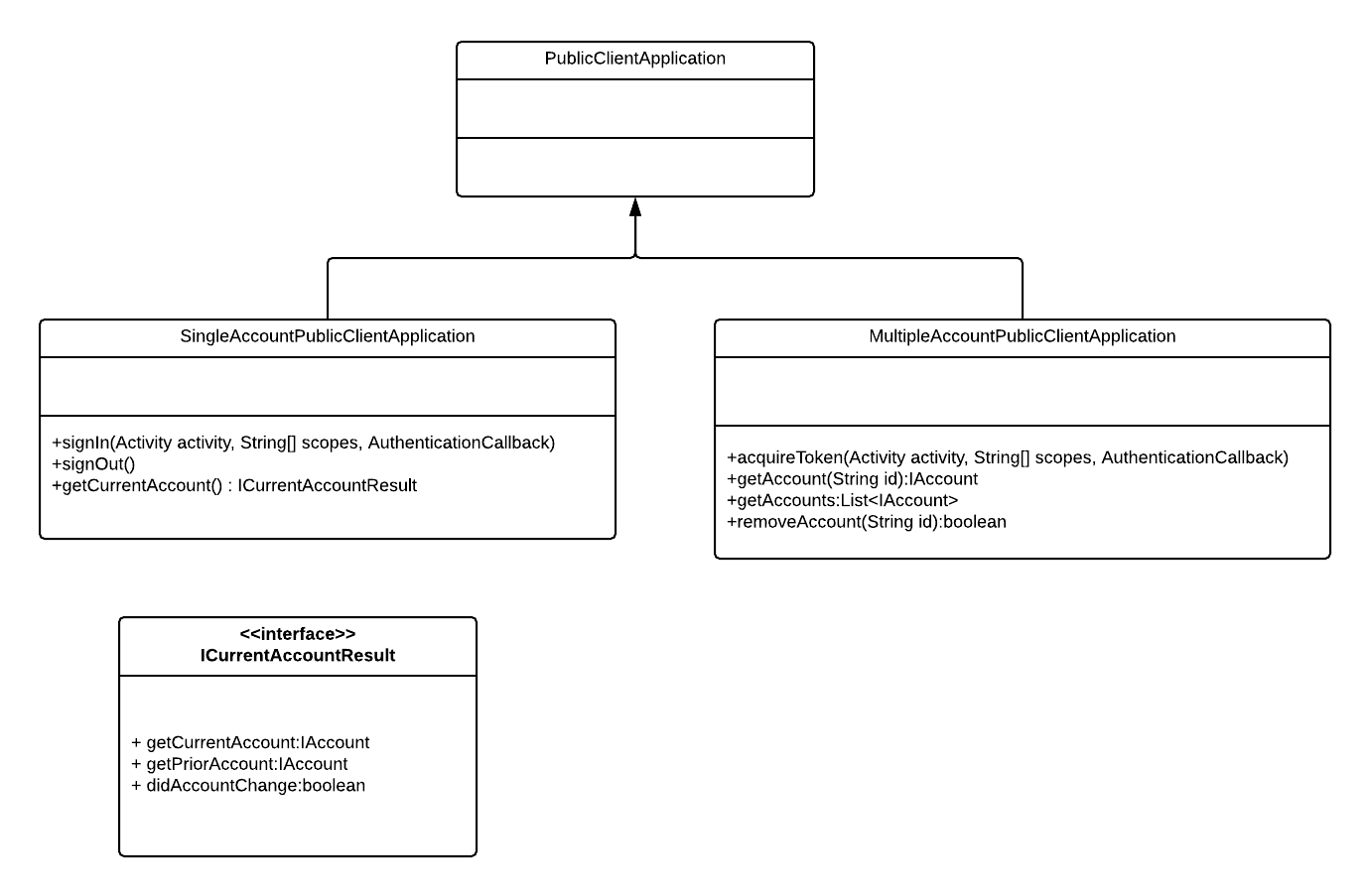本文帮助你了解单帐户和多帐户公共客户端应用中使用的类型,并重点介绍单帐户公共客户端应用。
Microsoft 身份验证库 (MSAL) 可以为客户端应用程序建模。 大多数 Android 应用都被视为公共客户端。 公共客户端是无法安全保存机密的应用。
MSAL 提供专业的 PublicClientApplication API 交互面来简化和阐明每次只能使用一个帐户的应用的开发体验。 PublicClientApplication 包括 SingleAccountPublicClientApplication 和 MultipleAccountPublicClientApplication 子类。 下图显示了这些类之间的关系。

使用 SingleAccountPublicClientApplication 类可以创建每次只允许登录一个帐户的基于 MSAL 的应用。 SingleAccountPublicClientApplication 与 PublicClientApplication 的差别体现在以下方面:
- MSAL 跟踪当前已登录的帐户。
- 如果应用使用中介(在 Azure 门户中进行应用注册期间使用的默认设置),并且安装在具有中介的设备上,则 MSAL 将验证该帐户是否仍在该设备上可用。
signIn允许通过请求范围单独显式登录帐户。acquireTokenSilent不需要帐户参数。 如果确实提供了一个帐户,但该帐户与 MSAL 跟踪的当前帐户不匹配,则会引发MsalClientException。acquireToken不允许用户切换帐户。 如果用户尝试切换到其他帐户,则会引发异常。getCurrentAccount返回提供以下内容的结果对象:- 一个指示帐户是否已更改的布尔值。 例如,从设备中删除某个帐户后,该帐户可能就会更改。
- 以前的帐户。 从设备中删除了帐户或者登录了新帐户时,如果需要执行任何本地数据清理,这些信息将很有用。
- currentAccount。
signOut从设备中删除与客户端关联的所有令牌。
如果在设备上安装了 Android 身份验证中介(例如 Microsoft Authenticator 或 Intune 公司门户),并且应用已配置为使用该中介,则 signOut 不会从设备中删除帐户。
以下伪代码演示 SingleAccountPublicClientApplication 的用法。
// Construct Single Account Public Client Application
ISingleAccountPublicClientApplication app = PublicClientApplication.createSingleAccountPublicClientApplication(getApplicationContext(), R.raw.msal_config);
String[] scopes = {"https://microsoftgraph.chinacloudapi.cn/user.read"};
IAccount mAccount = null;
// Acquire a token interactively
// The user will get a UI prompt before getting the token.
app.signIn(getActivity(), scopes, new AuthenticationCallback()
{
@Override
public void onSuccess(IAuthenticationResult authenticationResult)
{
mAccount = authenticationResult.getAccount();
}
@Override
public void onError(MsalException exception)
{
}
@Override
public void onCancel()
{
}
}
);
// Load Account Specific Data
getDataForAccount(account);
// Get Current Account
ICurrentAccountResult currentAccountResult = app.getCurrentAccount();
if (currentAccountResult.didAccountChange())
{
// Account Changed Clear existing account data
clearDataForAccount(currentAccountResult.getPriorAccount());
mAccount = currentAccountResult.getCurrentAccount();
if (account != null)
{
//load data for new account
getDataForAccount(account);
}
}
// Sign out
if (app.signOut())
{
clearDataForAccount(mAccount);
mAccount = null;
}
MultipleAccountPublicClientApplication 类用于创建允许同时登录多个帐户的基于 MSAL 的应用。 使用该类可以获取、添加和删除帐户,如下所述:
通过调用 acquireToken 一次或多次,在应用程序中使用一个或多个帐户。
- 调用
getAccount可获取特定的帐户。 - 调用
getAccounts可获取应用当前已知的帐户列表。
应用无法枚举代理应用已知的设备上的所有 Microsoft 标识平台帐户。 它只能枚举应用使用的帐户。 这些函数不会返回已从设备中删除的帐户。
可以结合帐户标识符调用 removeAccount 来删除帐户。
如果应用配置为使用中介,并且设备上已安装了中介,则调用 removeAccount 时,不会从中介中删除帐户。 只会删除与客户端关联的令牌。
以下伪代码演示如何创建多帐户应用、列出设备上的帐户和获取令牌。
// Construct Multiple Account Public Client Application
IMultipleAccountPublicClientApplication app = PublicClientApplication.createMultipleAccountPublicClientApplication(getApplicationContext(), R.raw.msal_config);
String[] scopes = {"https://microsoftgraph.chinacloudapi.cn/user.read"};
IAccount mAccount = null;
// Acquire a token interactively
// The user will be required to interact with a UI to obtain a token
app.acquireToken(getActivity(), scopes, new AuthenticationCallback()
{
@Override
public void onSuccess(IAuthenticationResult authenticationResult)
{
mAccount = authenticationResult.getAccount();
}
@Override
public void onError(MsalException exception)
{
}
@Override
public void onCancel()
{
}
});
...
// Get the default authority
String authority = app.getConfiguration().getDefaultAuthority().getAuthorityURL().toString();
// Get a list of accounts on the device
List<IAccount> accounts = app.getAccounts();
// Pick an account to obtain a token from without prompting the user to sign in
IAccount selectedAccount = accounts.get(0);
// Get a token without prompting the user
app.acquireTokenSilentAsync(scopes, selectedAccount, authority, new SilentAuthenticationCallback()
{
@Override
public void onSuccess(IAuthenticationResult authenticationResult)
{
mAccount = authenticationResult.getAccount();
}
@Override
public void onError(MsalException exception)
{
}
});